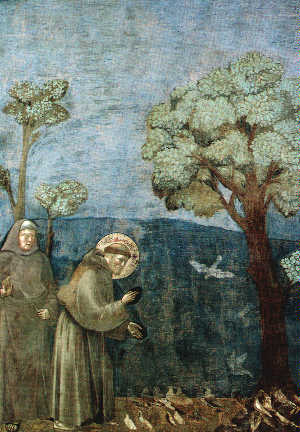Learning to be a Community of Faith
“The steadfast love of the Lord never ceases, his mercies never come to
an end; they
are new every morning; great is your faithfulness.”
Lamentations
3:22-23
I. Required readings
Christian Biography for the Day: Gladys Aylward
Philip Yancey, "Faith and Doubt"
Marcus J. Borg, “Faith: A Journey of Trust”
Chittister,
Chapter 12 (Stability: Revelation of the Many Faces of God), 147-59
Be sure to read the glossary entry on "stability" before you read this chapter
so that you understand something about the monastic vow of stability.
II. Quotations for the
day
"What enables a person to keep going back to the difficult parts of life is, inevitably, certitude in the faithfulness of God."
--Joan Chittister
A
Franciscan Benediction
May God bless you with discomfort,
 “Francis Preaching to the Birds” by Giotto
“Francis Preaching to the Birds” by Giotto
At easy answers, half-truths, and superficial relationships,
So that you may live deep within your heart.
May God bless you with anger,
At injustice, oppression, and exploitation of people,
So that you may work for justice, freedom, and peace.
May God bless you with tears,
To shed for those who suffer from pain, rejection, starvation, and war,
So that you may reach out your hand to comfort them and turn their pain to joy.
And may God bless you with enough foolishness,
To believe that you can make a difference in this world,
So that you can do what others claim cannot be done.
Amen.
III. Journal prompts
1. The Borg article likely offers for some of us a challenge to our notions of “faith.” What do you make of this challenge? In what ways does his understanding of faith—which he argues is a more biblical understanding of the notion—make more sense of the Christian life and the Christian story?
2. Chittister suggests that part of our problem
in contemporary culture may be that we're more concerned with comfort than with
depth. The monastic vow of stability is intended to be a hedge against running
away from one's problems, but instead offering one a context to go deep to
confront them. Chittister writes:
"It is
easy to be even-tempered in private. It is easy to be virtuous
alone. It is easy to be strong when untried. It is easy to win when
there is nothing to endure. It is also easy to be superficial and
self-centered and characterless. It is also easy to run from what I may
most need to confront in life if I am ever to be whole. Monastic
stability is concerned more with depth than with comfort."
Do Christians like us outside the monastery
make any vows or commitments that are similar to the monastic vow of stability?
How do these commitments or promises function in ways that are similar? In
short, how do these vows or promises help us nurture depth rather than
merely comfort?
3. Read back over the long paragraph on p.
156 that begins with the sentence: "What enables a person to keep going
back to the difficult parts of life is, inevitably, certitude in the
faithfulness of God." This paragraph suggests that what enables us
to keep our promises and commitments is not our own strength, but our hope in
"the gracious faithfulness of God." How might such a view of
promises and commitments
change the way you think about making and keeping them?
IV. Links of possible
interest
Do you ever wonder about the role of doubt in your life? Have you ever been in situations where you were afraid to admit you had doubts for fear of being looked down upon? In addition to the Yancey piece above, the following articles offer helpful perspectives on negotiating the rightful and healthy role that doubt plays in the Christian life.
Luke Larsen, "How Doubt Saved My Faith" An honest reflection on the vital relationship between faith and doubt by someone who didn't grow up in the church and who found himself drowning in his doubts.
Alister McGrath, "When Doubt Becomes Unbelief" One of the leading evangelical theologians in England insists that doubt isn't unbelief (and so isn't, by itself, a problem), but that doubt can become unbelief (in which case it can become a barrier to our relationship with God), and explains how to know the difference.